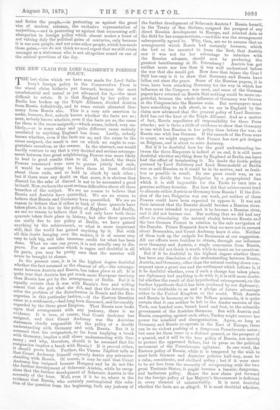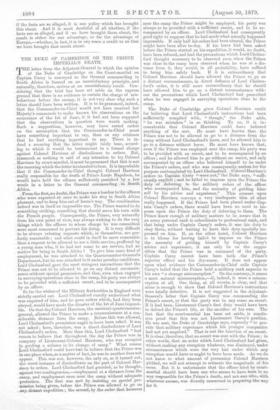THE NEW CLAIM FOR LORD SALISBURY'S FOREIGN POLICY.
THE last claim which we have seen made for Lord Salis- bury's foreign policy in the Conservative Press is the wisest claim hitherto put forward, because the most unsubstantial and unreal as yet advanced 'for it,—the most difficult to refute. It is that England by her policy at Berlin has broken up the Triple Alliance, divided Austria from Russia definitively, and to some extent alienated Ger- many from Russia also. This is a very safe assertion to make, because, first, nobody knows whether the facts are so ; next, nobody knows whether, even if the facts are so, the cause for them is the cause assigned,—which seems, indeed, very un- likely,—or is some other and quite different cause entirely unrelated to anything England has done. Lastly, nobody knows whether, even if the facts are so, and the cause be the cause assigned, the result is one on which we ought to con- gratulate ourselves, or the reverse. In the abstract, one would hardly venture to say that a very decided and serious estrange- ment between two great neighbouring Powers was more likely to lead to good results than to M. If, indeed, the three Powers concerned were sure to pursue jointly bad ends, it would be something to have them at least divided about those ends, and so held in check by each other ; but if there were any doubt on that score, it is obvious that discord for the sake of discord is not to be accounted a good in itself. Now, we have the most serious difficulties about all three branches of the subject. We see no reason to believe that Russia and Austria have quarrelled. We see no reason to believe that Russia and Germany have quarrelled. We see no reason to believe that if either or both of these quarrels have taken place, it is due to the policy of ngland. And finally, we see no reason to believe that if not only have both these quarrels taken their place in history, but also these quarrels are really due to our policy at Berlin, we have gained anything by the achievement, or what is more important still, that the world has gained anything by it. But with all this doubt hanging over the matter, it is of course very easy to talk big, and take immense credit for what has been done. What no one can prove, it is not usually easy to dis- prove. For an assertion which is vague and doubtful in all its parts, you may be pretty sure that the assertor will -never be brought to shame. In the present case, it is in the highest degree doubtful whether the fact assumed as the clearest of all,—the estrange- ment between Austria and Russia, has taken place at all, It is quite true that Austria has got much more European territory than Russia has got by the arrangement of Berlin. But it is equally certain that it was with Russia's free and willing assent that she got what she did, and that the intention to solve the problem of the disturbances in Bosnia and the Her- zegovina in this particular fashion,—if the Eastern Question came to a settlement,—had long been discussed, and favourably regarded by the three great Empires. That Russia now looks upon that arrangement with any jealousy, there is no evidence. It is true, of course, that Count Andrassy has resigned, and that Count Andrassy was the Austrian statesman chiefly responsible for the policy of a double understanding with Germany and with Russia. But it is assumed that his resignation, so far from implying a break with Germany, implies a still closer understanding with Ger- many; and why, therefore, should it be assumed that his Resignation implies a break with Russia If it proved either, it should prove both. Further, the Vienna Tagblatt tells us that Count Andrassy himself expressly denies any misunder- standing with Russia. Of course, it may be said that Count Andrassy has resigned because Hungary and he do not like the further development of Sclavonic Austria, while he recog- nises that the further development of Sclavonic Austria is the necessity of the hour. Well, even if it be so, where is the evidence that Russia, who certainly contemplated this solu- tion of the question from the beginning, feels any jealousy of the further development of Sclavonic Austria? Russia herself, in the Treaty of San Stefano, resigned the prospect of any direct Russian development in Europe, and selected Asia, as the field for her compensations,—and this was the arrangement subsequently agreed to. Why, then, are we to assume that an arrangement which Russia had certainly foreseen, which she had so far assented to from the 'first, that Austria saw it was not for her advantage to interfere with the Russian advance, should now be producing the greatest heartburning at St. Petersburg ? Austria has got neither more nor less than it was well understood before the war that she would get. How does that injure the Czar Still less easy is it to show that Germany and Russia have fallen out since the peace. Some of the Russian papers, it is true, have been attacking Germany for the way in which her influence at the Congress was used, and some of the German papers have retorted on Russia that nothing could be more un- grateful, because the whole influence of Germany was thrown at the Congress into the Russian scale. But newspapers must have something to talk about, as we see in England by the claim now advanced that the general policy of Lord Beacons- field has cut the knot of the Triple Alliance. And as a matter of fact, Russia repudiates all responsibility for these Press attacks ; nor is there a tittle of evidence to show that Germany is one whit less Russian in her policy than before the war, or Russia one whit less German. If the canards of the Press were to count, we might suppose that France has now got designs on Belgium, and is about to seize Antwerp.
But if it be doubtful how far the good understanding be- tween the three Emperors is indeed at an end, it is still more doubtful whether anything done by England at Berlin can have had the effect of terminating it. No doubt the feeble policy pursued by Lord Salisbury and Lord Beaconsfield at Berlin was as anti-Russian as it could be in its motive, and as fruit- less as possible in result. Its one great result was, as we know, to divide the two Bulgarias by a geographical line which it is still impossible for the Turks to turn into a genuine military frontier. But how did that achievement tend to alienate either Austria or Germany from Russia If the divi- sion of the two Bulgarias was our work, yet neither of these Powers could have been expected to oppose it. It was not their interest that the Danube should become a Russian river. It was never intended to permit it to become a Russian river, and it did not become one. But nothing that we did had any effect in stimulating the natural rivalry between Russia and the two German Powers in relation to the safe navigation of the Danube. Prince Bismarck knew that we were not in earnest about Bessarabia, and Count Andrassy knew it also. Neither of them took up the cudgels for Roumania at our suggestion. All our efforts were fruitless to obtain, through our influence over Germany and Austria, a single concession from Russia, which we did not think it worth while to insist on for ourselves.
But if it be doubtful in the highest degree whether there has been any dissolution of the understanding between Russia, Austria, and Germany, other than the natural cooling-down con- sequent upon a great war and the settlement which follows it, if it be doubtful whether, even if such a change has taken place, our diplomacy had anything to do with it, it is still more doubt- ful whether the result of that hypothetical estrangement, on the further hypothesis that it has been produced by our diplomacy, would be creditable to us and a pledge of future advantage either to the United Kingdom or the world. With Austria and Russia in harmony as to the Balkan peninsula, it is quite certain that it can neither be left to the tender mercies of the Turk, nor handed over, bound hand and foot, to the scientific government of the Austrian Germans. But with Austria and Russia competing against each other, Turkey might recover her power for mischief and disorganisation. Again, so long as Germany and Russia co-operate in the East of Europe, there can be no violent pushing of a dangerous Pansclavonic union ; but once let them come to a distinct quarrel, or the prospect of a quarrel, and it will be the true policy of Russia, not merely to protect the oppressed Sclavs, but to press on the political movement of the Pansclavonic agitators. In one word, the Eastern policy of Russia, while it is tempered by the wish to meet both German and Austrian policies half-way, must be a calm, considerate, and civilised policy ; but if it were once to be set free from the necessity of co-operating with the two
great Teutonic States, it might become a fanatic, dangerous, and barbarous policy. Hence the new claim put forward for the foreign policy of her Majesty's Government is deficient in every element of substantiality. It is most doubtful whether the facts are as alleged. It is most doubtful whether, if the facts are as alleged, it is our policy which has brought this about. And it is most doubtful of all whether, if the facts are as alleged, and if we have brought them about, the result is either for our advantage, or for the advantage of Europe,—whether, in fact, it is in any sense a credit to us that we have brought that result about.































 Previous page
Previous page